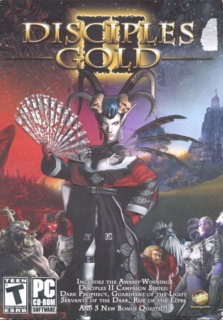Disciples delivers an obviously well-planned, complex, atmospheric turn-based RPG that hits the sweet spot.
The story takes place in the land of Nevendaar, scarred by brutal war between the human Empire, the dwarven Clans, the Undead Horde, the demonic Legion of the Damned and the Forest Elves.
A blessed Angel called Bethrezen was chosen by the Highfather to build the mortal world. Jealous angel contemporaries turned the newly minted paradise of Nevendaar into a war-torn land, by injecting corruptibility into the zealous, noble human race. The dwarves grew militaristic and avaricious, attacking their old friends for gain. The elven Goddess Gallilean showed the elven propensity for evil, burning innocent folk with the wrath of nature due to the loss of her beloved. Her followers became Dark Elves, the leaders of the Undead Horde. The forest elves are capable of genocide and heartless deeds, their natural arrogance turning into deadly suspicion; catalyzed by their suffering. The former paragon of Heaven, Bethrezen was punished for the corrupting work of the other angels, and his bitterness and rage spawned the Legion. Although the three mortal races seem naturally opposed to the demons and undead, in Disciples any race can be a foe or a quick ally, and alliances are as fragile as the paper they are written on. The narration and interesting dialogue snippets you encounter during play really help advance the story.
I am reviewing the original game and the Rise of the Elves expansion. The original game feature four sagas and many missions, with the expansion adding one extra saga, more missions and a mission generator. There is an incredible amount of value and time waiting to be well-spent on this game. The sagas feature 7 or 8 long missions each, tied in with an interesting story, and classy movies. Each mission can take you a good 3-5 hours. The missions are one-off scenarios with self-contained objectives, and the random mission generator achieves what it aims to do. Hotseat and modem games are availabe if you wish to cross steel and spell with a friend.
The meat of the game involves exploring the map with a hero and a handful of units, battling enemies to gain experience and level up your units. Enabling upgrades requires you to build the appropriate building in your capital. Units and heroes become increasingly valuable as they level up, and every mission requires one hero with high level minions to face the final threat. There is no unit stacking, one unit space is one unit; allowing for some tougher units take take two squares. Maps are filled with shops, resources and neutral critters as well as your enemies and possible allies. Maps are not bigger than they have to be. Some unit abilities such as paralysis seem imperfeclty balanced and can sometimes be a little bit irritating. There are very rare instances of trial and error, such as knowing when you are tough enough to venture into a certain region. The menu interface is efficient but not perfect, pressing the back button brings you back to the main menu; instead of one stage back. This is noticable when exploring options and the available missions.
Overall, Disciples is streamlined in that the amount of time you spend micromanaging armies is reduced, as is travel times. The seemingly simple strategy is actually very deep, as the interesting paths you can develop your units through; have major impacts on gameplay. The synergy between your different units is hard to master; especially when choosing your heros abilities. Espionage, diplomacy and spells play a part in the game, as will be mentioned below. Your capital city is as good as impregnable for most of the game, due to a very powerful Guardian unit. This eliminates the possibility of being eliminated due to exploring, although normal cities have no embedded Guardians and can be captured. Cities can heal and revive units, as well as providing a nice defensive bonus.
The game requires you to choose a Lord before the game begins. This lord essentially represents you as the mouse-clicker, not existing as a unit in game. You can choose Warrior, Mage or Guildmaster. The Warrior gives armies an extra 15% health regeneration per day, the Mage gives bonuses to casting spells, and the Guildmaster gives extra espionage options with your theif units. Although the Guildmaster is interesting, the Warrior and the Mage are normally more useful. The basic thief functions available to all Lords such as Poison and Inflitrate are very useful atleast once or twice each mission. The choice of Lord allows more interesting synergy decisions when commanding your armies.
The graphical design for the game is amazing, although keep in mind the technology is very old by this point. The baroque, detailed portraits of units are superb, giving a real gravitas to the proceedings. A noble, hardened paladin; a fierce unholy devil; the pictures portray these icons in a heroic and respectful way. The map graphics are nothing special, but are very well designed and richly detailed. Combat animations and city-scape graphics are grand and energetic. Movies in this game are extremely well-made, with a good mix of moving images and real animation.
The sound is competent, above average but not spectacular narration; very natural sounding in-game acknowledgements, great sweeping music and apt sound effects. There is a lack of any very annoying menu or ability sound effect that sometimes slips through developer's notice, and that is a nice thing.
The makers of Disciples obviously sought to make a turn-based RPG with consistent quality, and a focus on the sweet spots of decision making and exploration. The result is a very addictive game with few frustrations. I played for hours on different occasions, experiencing the 'just one more turn' effect seen in Sid Meier's game franchise Civilization. The game manages to offer short and long term satisfaction.

